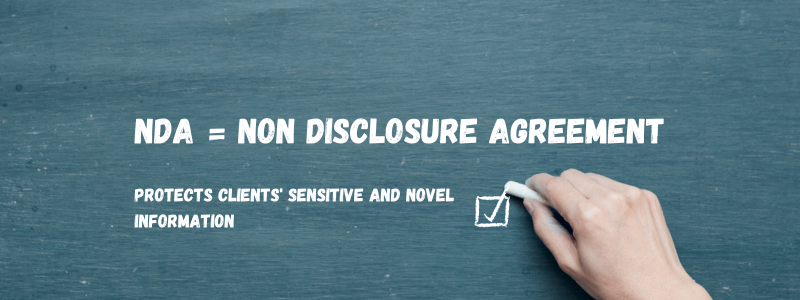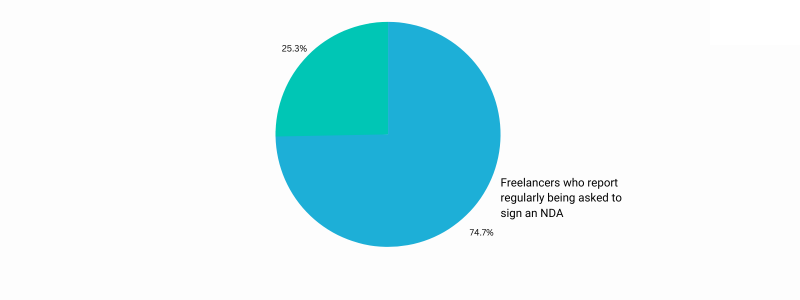What Is an NDA (Non-disclosure Agreement)?

There are many new and confusing legal complexities that you may encounter along your freelancing journey. One of these is the Non-Disclosure Agreement or NDA; you must understand what an NDA is, and what to expect when asked to sign one of these legal documents.
This article will explain what an NDA is, its importance in the freelance industry, and what information NDAs usually contain.
Table of Contents [Show]
What is an NDA?
The term “non-disclosure agreement” refers to a legal agreement between two or more parties that prohibits them from disclosing confidential information to third parties or using the information for unauthorized purposes.

What is an NDA? NDAs are usually used in business dealings, to protect sensitive information from being released to the public. Examples can include information about new products, intellectual property, or other sensitive data. The terms of the NDA will usually depend on the specific needs of the parties involved, but they generally prevent the signer from speaking about or sharing any information about the situation, either indefinitely or for a disclosed period of time.
Why Are NDAs Important Within the Freelance Market?
According to a study by Freelancer Map, 74.7% of freelancers surveyed reported that they are almost always asked to sign an NDA agreement before they start working with a client. It is extremely likely that you will encounter a client requesting that you sign an NDA before working with them, as you may be dealing with sensitive information during your work. Therefore, it is essential that every freelancer be well-versed in NDAs and what they are.

You may also be working with their competitors as well as their clients, which is another reason that clients may ask you to sign an NDA. This is to prevent you from sharing their information with the competition, whether intentional or not. However, NDAs cannot protect information that is in the public domain or that was disclosed before the NDA was signed.
The Benefits of NDAs for Clients
NDAs are more commonly requested by the client for the freelancer to sign. This is due to sensitive or novel information being shared with the freelancer during the working relationship, and with the aim of protecting that information from being shared. Benefits of NDAs for freelance clients include:
Protection of Sensitive Information
Non-disclosure agreements are designed to protect sensitive client information from being shared to third parties. When the freelancer signs an NDA, the client can rest assured that their data is in safe hands and will not be distributed.

Control Over Intellectual Property
NDAs can address intellectual property rights, ensuring that the client retains ownership of the work produced by the freelancer. This can be crucial in projects where the client wants to maintain exclusive rights to the deliverables or prevent the freelancer from using or sharing the work elsewhere.
Legal Recourse in Case of Breach
If a freelancer breaches the terms of the NDA and discloses confidential information without authorization, the client can take legal action. The NDA acts as a contract, and establishes a legal basis for seeking damages and other remedies for any harm caused by the breach.
Facilitating Collaboration
When clients have the confidence that their information is secure, they are more likely to share additional details, insights, and resources with freelancers. This can lead to a deeper understanding of the project requirements and better collaboration and communication throughout the working relationship.
Key Elements of an NDA
Within an NDA, you may encounter terms and phrases that you do not understand, or need more clarification on. Below are some key elements of non-disclosure agreements that you may encounter, and what they mean.
- A Description Of The Confidential Information: The specific type of information that cannot be shared should be described within the NDA. Examples include intellectual property, proprietary information, or every discussion and interaction between the client and the freelancer.
- The Requirements And Responsibilities Of The Parties: The NDA should define the responsibilities and requirements of the party receiving the information. The recipient of the information will be required to protect the confidentiality of the information and refrain from using the information for their own personal gain.
- Exclusions To The Confidentiality Agreement: Some information, such as that which is under the public domain or that must be shared with a third party for the sake of the project, can be excluded from the NDA.
- The Term Of The Non-Disclosure Agreement: This should state the specific period of time for which the NDA is valid. Thereafter, the recipient is no longer obligated to withhold this information, and no legal action can be taken against them for doing so.
- The Consequences Of Breach: This should outline the consequences for if the recipient were to breach the terms of the NDA before the NDA expired. Consequences can include fees for damages, termination of the working relationship, or legal action.
Conclusion
NDAs play a significant role in the freelance market, as they help to protect the sensitive information shared between clients and freelancers. They provide clients with the assurance that their confidential information will remain secure and not be disclosed or used for unauthorized purposes.
As a freelancer, it is important to understand the implications of NDAs and carefully review the terms before signing. By respecting and adhering to the terms of NDAs, freelancers can build trust with clients, enhance collaboration, and ensure the protection of confidential information throughout their working relationships.


